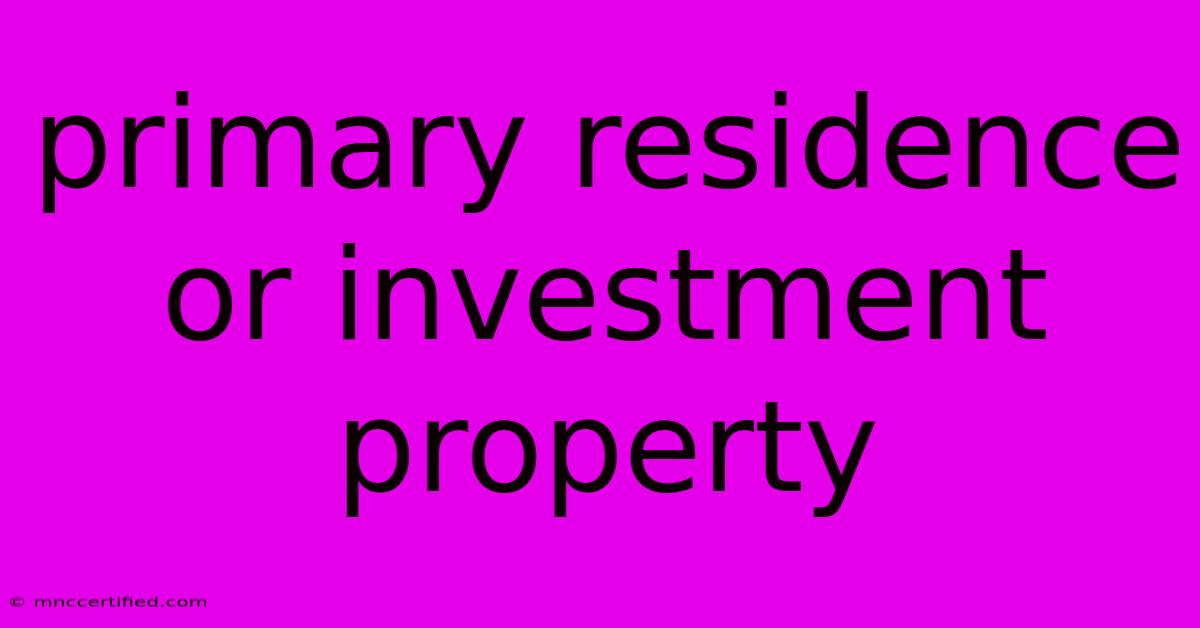Primary Residence Or Investment Property

Table of Contents
Primary Residence vs. Investment Property: Which is Right for You?
Deciding between a primary residence and an investment property is a significant financial decision with far-reaching consequences. Both options come with unique advantages and drawbacks, so understanding the nuances of each is crucial. This guide will equip you with the knowledge you need to make an informed choice that aligns with your financial goals and lifestyle.
Primary Residence: Your Home Sweet Home
A primary residence is the place you call home, where you live and build your daily life. It's more than just a roof over your head; it's a foundation for your personal and family life.
Benefits of a Primary Residence:
- Tax Advantages: You can deduct mortgage interest and property taxes on your primary residence, saving you significant money on your tax bill.
- Stability and Belonging: Owning a primary residence offers a sense of stability and belonging. You have control over your living environment and can personalize it to your liking.
- Equity Building: As you pay down your mortgage, you build equity in your home, which can be used as a down payment for another property or accessed through a home equity loan.
Drawbacks of a Primary Residence:
- Limited Flexibility: Owning a primary residence ties you to a specific location, limiting your options for relocation or travel.
- Maintenance and Repairs: Maintaining a home requires ongoing expenses, from routine upkeep to unexpected repairs.
- Market Volatility: The value of your home can fluctuate with the real estate market, potentially leading to financial losses if you sell during a downturn.
Investment Property: Your Income-Generating Asset
An investment property is a real estate asset you acquire with the goal of generating income through rental payments or appreciation in value.
Benefits of an Investment Property:
- Passive Income: Rental income provides a steady cash flow that can help you achieve financial goals, such as retirement savings or debt reduction.
- Appreciation Potential: Over time, real estate values often appreciate, providing a potential return on your investment.
- Tax Benefits: You can deduct expenses related to your investment property, including mortgage interest, property taxes, insurance, and repairs, from your rental income.
Drawbacks of an Investment Property:
- Higher Risk: Investing in real estate involves inherent risks, including tenant issues, property management expenses, and potential market downturns.
- Management Responsibilities: Managing a rental property requires time, effort, and expertise, including finding tenants, collecting rent, and handling maintenance requests.
- Financing Costs: Obtaining financing for an investment property typically involves higher interest rates and down payment requirements compared to a primary residence.
Choosing the Right Path
The best choice for you depends on your individual circumstances and financial goals. Here's a breakdown to help you decide:
Consider a Primary Residence if:
- You prioritize stability and personal space.
- You want to build equity and potentially benefit from tax deductions.
- You're looking for a long-term home where you can put down roots.
Consider an Investment Property if:
- You desire passive income and potential appreciation.
- You're comfortable with the risks and responsibilities of property management.
- You're looking to diversify your investment portfolio.
Hybrid Approach:
For some, a combination of primary residence and investment property might be the ideal solution. You could purchase your primary residence and then invest in a rental property once you've established financial stability.
Tips for Success
Regardless of your choice, here are some tips to help you succeed:
- Do Your Research: Thoroughly research the real estate market, understand local regulations, and seek professional advice from real estate agents and financial advisors.
- Plan Financially: Develop a detailed budget and ensure you have sufficient funds for the down payment, closing costs, and ongoing expenses.
- Consider Location: Choose a location that is desirable to tenants, with potential for long-term appreciation.
- Set Realistic Expectations: Investing in real estate requires patience and a long-term vision. Be prepared for unexpected challenges and market fluctuations.
Conclusion
Whether you choose a primary residence, an investment property, or a hybrid approach, the key is to make an informed decision based on your individual needs and goals. By carefully considering the advantages and drawbacks of each option, you can find the path that aligns with your financial aspirations and lifestyle.

Thank you for visiting our website wich cover about Primary Residence Or Investment Property. We hope the information provided has been useful to you. Feel free to contact us if you have any questions or need further assistance. See you next time and dont miss to bookmark.
Featured Posts
-
Outer Banks Season 4 Finale Explained
Nov 08, 2024
-
Farmers Insurance Democrat Or Republican
Nov 08, 2024
-
Farmers Mutual Hail Insurance Co Of Iowa
Nov 08, 2024
-
Manchester United Vs Paok Europa League Live
Nov 08, 2024
-
Cosmetic Dentistry Bonding Before After
Nov 08, 2024